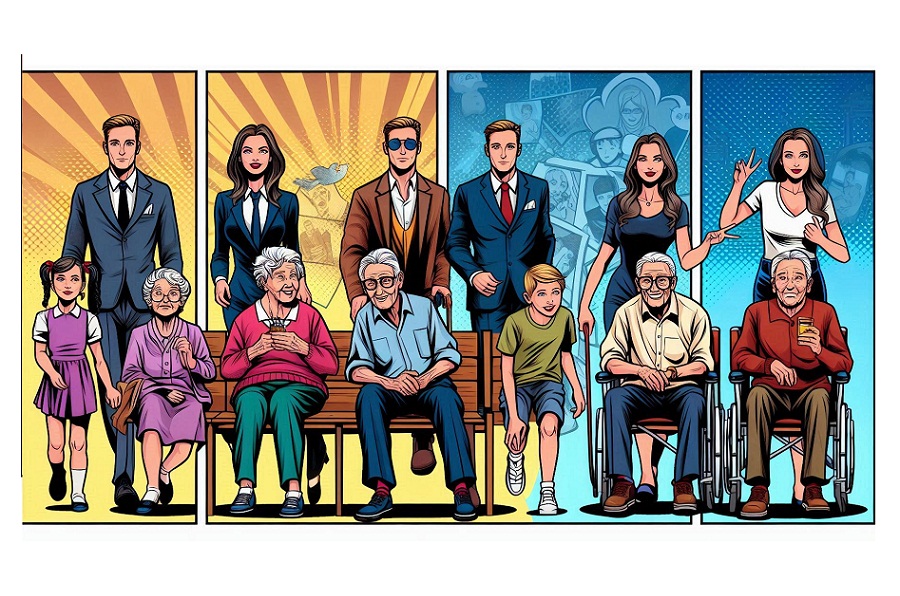
Published :
Updated :

Do you think the world is the same as ever? No, it is a new world where lifestyle, technology, and culture change rapidly. To cope with this evolving world, building tolerance between generations is more crucial than ever.
Dramatic differences in perceptions can be encountered based on the era a person grows up in, which might often lead to conflicts or misunderstandings.
In intergenerational harmony to foster, both the old and young must be receptive to each other's experiences, challenges, and lifestyle choices.
The generational gap
Discipline and structure have been the core values of the older generation at a slower pace. They valued experience over instincts, as their decisions were often influenced by the wisdom that came with age. On the contrary, younger generations are full of life, rich in information, and fast-paced where their core values are innovation, spontaneity, and personal freedom.
Aziza Begum (86), from Mohammadpur, expresses her sentiment when she reflects on her grandchildren. "Today's children are far smarter than we were at their age," she acknowledges. "But they lack the life experience, which is why they should heed the advice of elders and follow their instructions."
Her perspective pictures the common belief held by the whole older generations. They strongly believe wisdom comes with age, and young people, despite their knowledge, may overlook certain pitfalls in life.
However, Shafiq Khan (60) businessman with dual citizenship in Bangladesh and the USA, offers a different view. "The world moves faster than before," he says. "Our perspectives will never align completely with the younger generation's, but as elders, we must understand their choices and give them the freedom of choice. We can only guide them by laying out the best and worst-case scenarios. The rest is up to them."
This viewpoint underscores a crucial step in building tolerance. The ideology should respect the autonomy of younger generations while offering the wisdom of experience without imposing it.
On the flip side, Sultana Samia (20), an undergrad at Army IBA, believes that generational tolerance can only be fostered through mutual understanding. "Both sides need to be patient and empathetic," she states. "It's not just about youngers listening to elders, but also about the older generation respecting the new world we live in." She highlights the fact that tolerance isn't a one-way street. All generations must be willing to listen, adapt, and meet halfway to establish proper communication.
Usually, in families, elder members often perceive younger members as reckless or overly romantic, while younger individuals may see their elders as outdated or resistant to change.
Commonly, conflicts can arise from disagreements over career choices, technology use, relationship dynamics, and even lifestyle preferences. Here, communication plays a major role in these heated disagreements.
While the older generations prefer traditional face-to-face interactions, younger ones prefer communication through digital platforms, and the upsurge of differences can lead to misunderstandings and feelings of disconnect.
The advancement of technology plays a remarkable role between these generations as younger are adapting to it very quickly, and most of the elders might be struggling. And thus it might create a sense of frustration for both sides.
Steps toward tolerance
The initial step to minimize the generational gap is the acknowledgement of both sides that neither of them has a monopoly on wisdom or understanding. The older generation has the benefit of life experience, while the younger generation brings fresh perspectives and adaptability to change.
Open Communication is a sensitive element of building tolerance to create a mutual space for both to feel heard and respected. Instead of lecturing or trying to 'win' an argument, constructive, engaging conversations while both generations express their concerns and opinions openly with a sense of respect are desired.
Empathy and patience
Youngers must appreciate the hardships and lessons that older generations have endured throughout their lives. However, the elders should empathize with the pressure and complexities of the modern lifestyle of youngsters.
Collaboration, not confrontation
Both generations can learn from each other. Elders, by sharing their wisdom, offer guidance on long-term thinking and resilience, and younger generations, by introducing new ideas, such as innovations in technology, and provide fresh approaches to problem-solving. This shall lead to growth for each side.
Encouragement with guidance and gratitude
Mutual respect and growth are fostered when youngsters are gently guided and they respond with gratitude towards their elders.
Building tolerance between generations is not about proving one side right or wrong.
It is about creating an environment where both the old and the young can coexist peacefully, learn from each other, and thrive together.
Samiha Mamun is an undergraduate student at the Army Institute of Business Administration (Army IBA), affiliated with the Bangladesh University of Professionals in Savar, Dhaka. She can be reached at samihamamunmeem@gmail.com


 For all latest news, follow The Financial Express Google News channel.
For all latest news, follow The Financial Express Google News channel.